- Home
- Courtney Milan
The Pursuit Of… Page 3
The Pursuit Of… Read online
Page 3
He’d fought. He’d survived. Damn it, he ought to be able to go home.
Home might no longer exist.
He needed help. He needed a goddamned legion of soldiers to put down whatever unrest his family faced. He needed constables who cared about the peace of black freedmen, and not just the whispers of their white comrades. He needed laws that would protect the ones he loved.
All he had were his own two hands, and one of them was presently in a sling.
A true offer of help would have been welcome. But this one? This offer wasn’t honestly meant. Any of the things John desperately needed were off the table.
This man didn’t want to help; he wanted a handshake. Even that was off the table; after they’d parted ways, John had stupidly injured his right shoulder tripping over a rock on the way up the redoubt. Latham wanted a modicum of reassurance that he was a decent fellow.
John’s shoulder hurt. He was too tired to reassure anyone, let alone pretty British officers with undisclosed pretensions.
John exhaled slowly. “I know how this dance is supposed to work. I say there’s nothing I can think of. You press me to think of something; I demur, because we both know you don’t really mean it. We shake hands, or I try to”—he gestured with his head to the sling—“and you leave, convinced you’ve done everything possible.”
“Is that how it’s supposed to go?” Henry looked at him with wide eyes. “That’s a good bit more fleshed out than my list.”
John ignored him. “It turns out that I’m tired. Nobody ever taught me which fork to use, and I ran out of etiquette somewhere around the time I was trying not to lose my toes at Valley Forge. I do need something, and I don’t care about pinning a polite little medal saying, ‘Well, at least you tried’ on your shoulder.”
“You Americans have medals saying that?”
John stopped, shaking his head. “No. Of course we don’t. It’s figurative.”
“Of course it is. Pardon the interruption. You were going to tell me what you needed.”
“I—” Latham really was rather odd. John paused, regrouping. He almost felt like a bit of a heel doing this, but—
“I’m taking my leave of the army tomorrow,” he said. It had taken a bit of negotiation, that, but the doctor hadn’t known if he would recover the use of his arm. John had been desperate to go home, to find his family; the Continental Army was counting the cost of soldiers lying about doing nothing while the peace accords started.
“They’ve no need for an injured soldier, and I may never be able to use my arm.” John, in fact, believed no such thing. He had exaggerated the pain with the express purpose of convincing the doctor to declare him officially an invalid. He had to get home.
“I have a long journey ahead of me. Anyone who might otherwise accompany me on the road is either white or dead. And—” No. He wasn’t about to disclose his worries about his family to this man.
“Right. Is that it?”
“Is that it?” John echoed. “I’m going on foot. There are bandits on the road. We’ll be living off the land as we move, so I hope you know how to set traps.” He glanced at the man. “I hope you have a taste for squirrel meat, too. It’s rather late in the year.”
“Where is your home, then?”
“Rhode Island,” John said pointedly.
“Ha, I guessed right!”
“It’s some five hundred, maybe six hundred miles distant,” John said repressively.
Latham folded his arms. Right. Here it came. The polite refusal.
“Sounds better than selling cheese,” the other man said. “When do we leave?”
John blinked and looked over at the man. He was sitting contentedly in place, breaking the crust of his bread into pieces. The firelight made his hair seem even more orange than it had before. He didn’t look as if he was lying.
He had to be lying. He didn’t mean it.
“Tomorrow morning,” John said in slow disbelief. “You understand that people like me aren’t…loved in these parts? We’ll move fast. We’ll have no luxuries. I have no money to speak of.”
A tiny frown touched Latham’s face. Finally. It had taken long enough to put him off. But instead of protesting and suddenly discovering he had other things to do, Latham just bowed his head and considered his soup bowl.
“Well. That makes my head hurt all over again. Does that not make your head hurt?”
John looked over at Marcelo, who shook his head in equal confusion.
“You can’t say the cheese is delicious and not eat the cheese,” Latham muttered. “It’s just not done.”
Maybe he caught their disbelieving stares, because he smiled helplessly. “It makes sense inside my head,” he said. “Or rather—it doesn’t make sense, that’s the entire point. I swear to you, I’m not as stupid as I appear.”
“I see,” John said, even though he didn’t.
“But look at me,” Henry said. “My father used to say I was empty-headed, but I assure you, it’s not true—quite the opposite, in fact. There’s too much in my head, not too little. Pretend I never said anything. I meant to ask—what time shall I meet you, then?”
“Have you ever traveled thirty miles in a day?” John demanded. “Day after day, all in a row?”
“Of course.” Latham looked almost indignant.
“On foot?”
“Ah…” A beat of hesitation. “Well… Not exactly? But I’m quite capable, really. Don’t worry about me. Sunrise—will that do?”
“Sunrise is fine,” John said in disbelief.
“Right. Then I shouldn’t dawdle. I’ve a great deal to do in preparation. I’ll see you then.”
“Right,” John echoed scornfully. He watched the other man leave with a shake of his head.
“What was that?” Marcelo asked.
“I don’t know,” John said, “but even odds, he’ll not arrive in the morning. At any rate, prissy fellow like him—he’ll beg off ten miles into the journey, complaining of blisters.”
Marcelo nodded his head in agreement. “Lord above,” he finally said. “I will never understand humanity. People are strange.”
“Hmm.” Latham’s figure disappeared into the darkening night. John sighed. “Something tells me this one is particularly queer.”
* * *
“Good day!”
John had taken his leave from camp. He’d carefully shaken the left hands of the men with whom he’d spent years cooking squirrels and stones into soup. Captain Olney had given him a nod and a final goodbye. Colonel Hamilton—with whom John had spent less than twelve hours on the battlefield—had clapped his good shoulder and made another idle promise—“If ever you’re in need, let me know and I’ll put my name to use to offer some assistance.”
John had left the Continental Army encampment an hour after sunrise. By the time he walked out the gate, he’d managed to forget Latham—completely—again.
But here he was, standing next to the road, arms folded and smiling brightly. “It is a nice day, isn’t it?”
John stared stupidly at him, it being too early in the morning for this level of explosive cheerfulness.
“How are you doing this fine morning, John?” He came over and clapped a hand against John’s shoulder. Pain shot through him like lightning.
John didn’t wince. He didn’t even let himself shiver. Instead, he brought his good hand up, catching the other man’s wrist, yanking it away from his shoulder.
Their eyes met.
Touching a white man like this, in reprimand… Not a good idea.
Latham didn’t look likely to burst into violence, no matter what had been said about him on the battlefield, but then, you never could tell with some of these fancy types. Some of them could go from laughter to the most violent rage in the blink of an eye. It wouldn’t matter that John had saved his life. It wouldn’t matter if John had been his brother. John was black; Latham was white. And if Latham was one of those—one who would take offense at the slightest hint that h
e needed to treat John as human—then it was just as well John find out now.
“Not that shoulder,” John said.
“Oh.” Latham’s eyes widened. “I am such an idiot. I had forgotten, and the sling is under your jacket…”
“Don’t want everyone on the road thinking me an easy mark.” John looked at him. “Not the other shoulder, either.”
Latham frowned.
“It’s not wounded,” John explained. “I’m just not one for giving or receiving punches in various spots of my body to demonstrate my manhood.”
“Oh. A handshake then?” Latham extended his arm.
It would be boorish to brush that off, and in all honesty, John was beginning to suspect that Latham was something of a puppy—earnest, exuberant, and utterly devoid of house-training. John sighed. Latham’s shoes looked far too fashionable for a journey of five hundred miles. He’d quit in a day, two at the most.
Very well. John could handle anything for a day, even a puppy.
He held out his left hand. Gingerly, awkwardly, their hands met. Latham’s gloves were some sort of soft leather against John’s bare calluses.
“Well. No point dawdling.”
“We’re off,” Latham said. “This is so exciting! I’ve never been on a walking trip, did you know?”
A walking trip, as if this were a jaunt through the woods for pleasure. He’d last three hours at best.
“Although, that’s not true, come to think of it. I walked thirty-five miles to my gran’s house when I was twelve and was scolded roundly. So, ha, perhaps I have a little experience. Although that took two days.”
John glanced over. Latham kept going.
“She didn’t scold me, mind—it was my father, and I suppose the dean, who seemed to think a trip to my grandmother’s was superfluous when I had a Latin examination. As if avoiding the Latin examination were not the very point of the trip! Ah well. Sic transit gloria Henry.”
John just shook his head at him.
“That’s all the Latin I remember now, so maybe the dean had a point? But then, I’ve never needed to know Latin, so maybe I also had a point too. What did he suppose would happen?”
John did not hazard an answer. He wasn’t sure who the he in that sentence was, and he didn’t want to ask.
“If ruffians descend upon us and demand that I conjugate Latin verbs, I will be unable to save us by means of quick thinking,” Henry said. “I apologize for my failures in advance. I also, however, will apologize to the ruffians, because I cannot imagine what sort of heartbreaking childhood would lead them to make such bizarre demands. Ah, maybe we’d have something in common! Come to think of it…”
Latham was going to give up. Any mile now, he’d beg off. And even if he didn’t, if John didn’t say anything, Latham would have to stop talking. Eventually.
He would, wouldn’t he?
* * *
Latham did not stop talking.
Not that morning. Not that night, as he asked about John’s shoulder and if cold compresses helped, and if they didn’t, if hot compresses did. He talked as he prepared some kind of a…thing…of cloth and herbs and warm heat over the fire for John. He talked as they ate and offered John bread and disgusting cheese.
John took the bread.
He talked the next morning—more cheese, more bread, more stories about goats and chickens and his father, whom he did not like, and his mother, whom he did. He did not stop talking.
Not that night. Not the next morning, nor the morning after, nor even the morning after that. John had imagined that Henry Latham would complain of hunger, weariness, thirst, and general malcontent.
Had John been given more than a few minutes to think the matter over, he might have realized that a man who greeted a nighttime assailant with “nice weather for a siege?” was unlikely to be a complainer.
He was just as unlikely to be silent.
He talked.
And he talked.
And he talked.
After the first few days, John had resorted to the desperate measure of not responding to even direct questions—not a nod of the head, not a grunt, not so much as a commiserating glance out of the corner of his eye—in order to satisfy his own curiosity about how long it would take Latham to run out of words.
Four days since they’d started their journey, and Latham was still going.
It had become a battle of wills: Latham wanted to engage John in conversation, and John refused to give in. Latham talked through the entirety of one day. Then the next. He talked until Virginia was gone, and Maryland, with its almost bare forests and its red, crunchy leaves underfoot, stretched before them.
Latham talked and talked, and one week into their journey, John realized he had made a grave error in his calculations: Latham talked, and John didn’t hate it.
Chapter Three
Henry Latham was all too aware that John Hunter seemed to be engaged in a heroic battle to avoid conversation. He’d managed to set up camp for two nights running without saying a word.
He hadn’t complained when Henry had brought out the cheese.
“Here,” Henry said, holding a slice of death-smelling cheese out to him. “Have some!”
A shift of Hunter’s eyes out to the horizon was his only response.
“Day nine,” Henry said. “I am eating the cheese. The cheese will be delicious. It will be amazingly delicious. It will positively melt in my mouth.”
He put the slice on his tongue. It tasted like feet and frog shit. Henry choked, coughing, and reached for his tin flask of water.
Across from him, John tried very hard not to smile.
“Alas. The cheese prevails once again,” Henry said. “The taste is not yet acquired. Ah, well. Tomorrow is a new day.”
John just looked at him.
“You really should try the cheese,” Henry said. “You seem like the sort of open-minded fellow who would find…something to love in this cheese.”
John’s mouth opened, then clapped shut. Such a valiant effort.
Futile, but valiant. From long experience, Henry knew that he was highly unlikely to shut up, not for any reason. He wasn’t made for silence.
Nobody was, really. Henry had once been told—perhaps by one of the tutors whom his father had hired to try to make him a sober, learned fellow and who instead had been inexorably pulled into a lengthy discussion of some arcane, unimportant point of history—that resisting him was like trying to hold the ocean in place with one’s fingers. It wouldn’t work, and the ocean (if it felt anything about the matter, which it might, because who knew what oceans thought about? Not Henry, although he could speculate) regarded the effort with nothing so much as amusement.
They were three miles out of Philadelphia, one early morning, when Mr. Hunter finally gave in.
He stopped dead in his tracks.
He turned to Henry. He rubbed his head with his free hand. His hair was growing from short, tight curls into medium tight curls, not yet so long that they could be put into disarray. He glanced at Henry and finally spoke.
“Do you ever get tired of talking?” he demanded.
Henry gave him a delightful smile. “You lasted so long! Twelve entire days—really, I’m so impressed! That was excellent. Utterly excellent!”
Hunter narrowed his eyes at him. “What do you mean?”
“I wish we had those little medals you were talking about earlier,” Henry said appreciatively.
“What? What medals?”
“The tin ones. The ones that said ‘Well, at least you tried.’ I would award you one right now. You definitely deserve it, don’t you think?”
Hunter gave him an unblinking stare. For a moment, he tilted his head, as if trying to make sense of what Henry was saying. Henry could have told him there was no point in that either.
“You didn’t answer my question,” Hunter said. “Do you ever get tired of talking?”
Right. Henry had been so delighted at the fact of a question that he’d forgot
ten to answer.
“What an excellent question.” He considered it now. “Tired of talking? What an odd idea. Let me check.” The possibility had honestly never occurred to Henry. The back of his throat tickled—just a hint of incipient soreness, not enough to bother him—and if they hadn’t passed a creek a mile or so back, his mouth would be dry. He tentatively tested his tongue, moving it in his mouth from side to side. His feet were a little sore. His tongue? No signs of fatigue at all.
“No.” He cast a bright smile at his walking companion. “I don’t believe I do. Is there a reason you ask?”
Mr. Hunter had been—over the past week or so—slowly losing his touch. The repressive look he gave Henry was scarcely forbidding. He looked as if he was on the verge of smiling.
Oh, he tried not to react to a thing Henry said. But he had failed. Henry had been counting Hunter’s smiles. He was at four thus far this morning.
“Simple curiosity,” Mr. Hunter said. He shook his head and started walking once more. “Thus far this morning, you’ve covered the finer points of piquet strategy, the musical oeuvre of Handel, and the various gaits of horses along with their utility in exacerbating lower back pain. It’s not even midday. Aren’t you afraid you’ll run out of words? Or ideas?”
“Not in the least.” Henry glanced over at Mr. Hunter. “I should warn you, I’m a talkative sort.”
“I had surmised that to be the case sometime over the last hour or hundred.”
“If it bothers you, I can keep quiet.”
“Really? In that case…” The man seemed to be considering that as if it were a real possibility.
“I only meant for a minute, maybe two. I always forget that I’m supposed to be doing it,” Henry added.
Hunter’s lip twitched. “I knew the offer was too good to be true.”

 Her Every Wish
Her Every Wish Midnight Scandals
Midnight Scandals After the Wedding
After the Wedding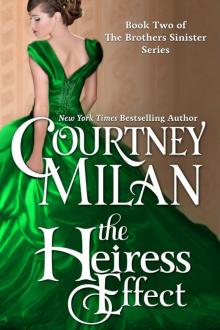 The Heiress Effect
The Heiress Effect Unraveled
Unraveled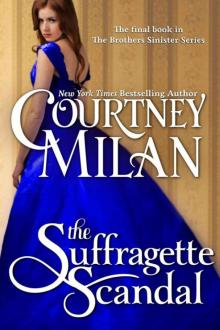 The Suffragette Scandal
The Suffragette Scandal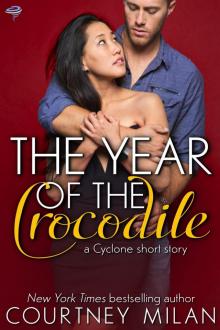 The Year of the Crocodile
The Year of the Crocodile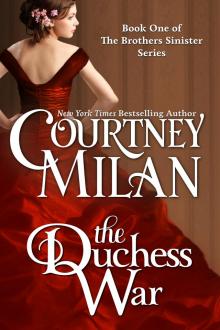 The Duchess War
The Duchess War What Happened at Midnight
What Happened at Midnight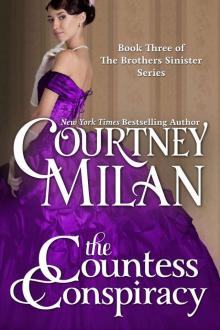 The Countess Conspiracy
The Countess Conspiracy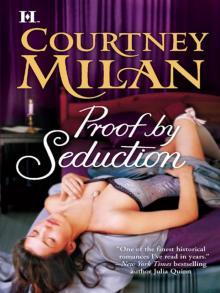 Proof by Seduction
Proof by Seduction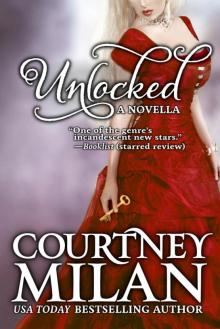 Unlocked
Unlocked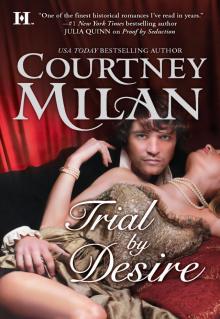 Trial by Desire
Trial by Desire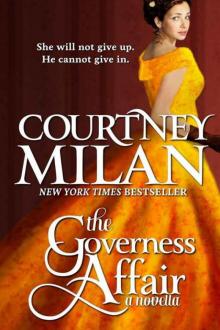 The Governess Affair
The Governess Affair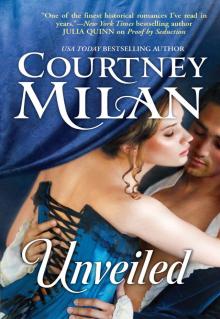 Unveiled
Unveiled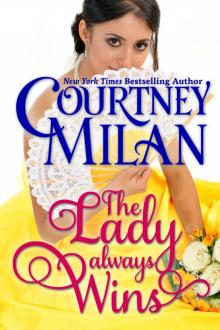 The Lady Always Wins
The Lady Always Wins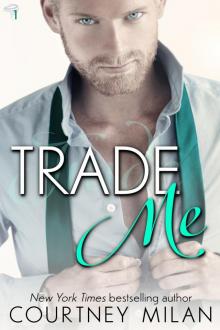 Trade Me
Trade Me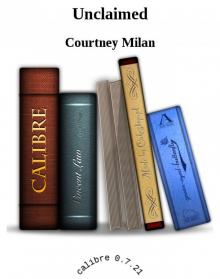 Unclaimed
Unclaimed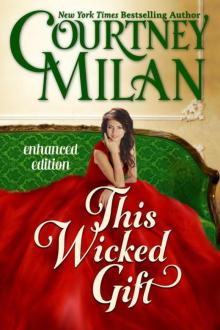 This Wicked Gift
This Wicked Gift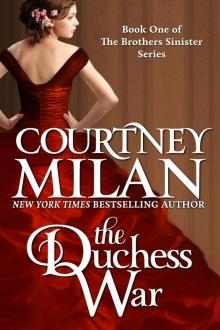 The Duchess War (The Brothers Sinister)
The Duchess War (The Brothers Sinister)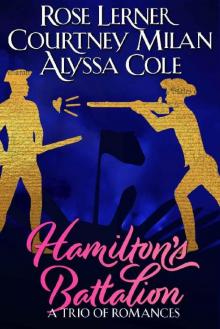 Hamilton's Battalion: A Trio of Romances
Hamilton's Battalion: A Trio of Romances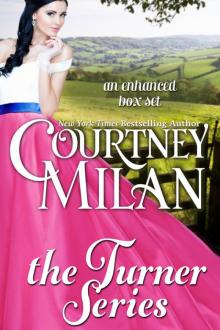 The Turner Series
The Turner Series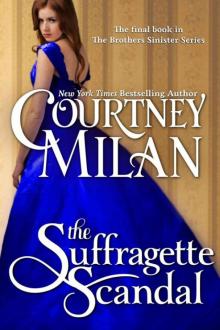 The Suffragette Scandal (The Brothers Sinister)
The Suffragette Scandal (The Brothers Sinister)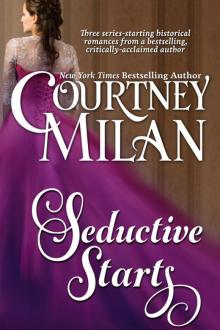 Seductive Starts
Seductive Starts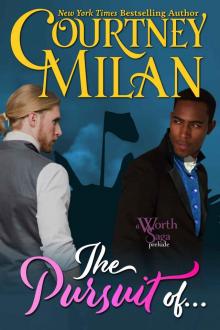 The Pursuit Of…
The Pursuit Of…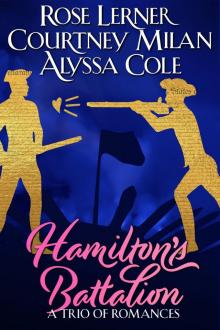 Hamilton's Battalion
Hamilton's Battalion The Carhart Series
The Carhart Series Seven Wicked Nights
Seven Wicked Nights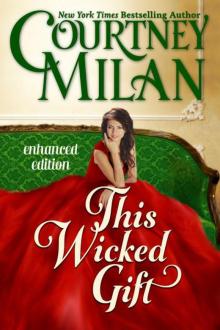 This Wicked Gift (A Carhart Series Novella)
This Wicked Gift (A Carhart Series Novella)